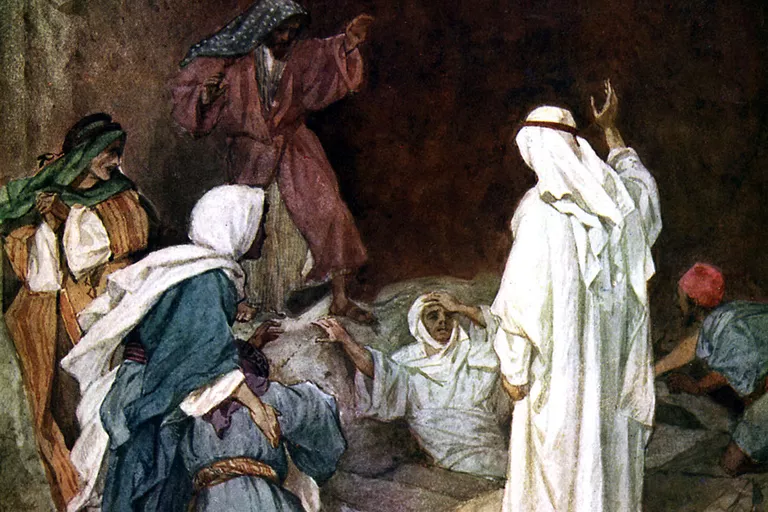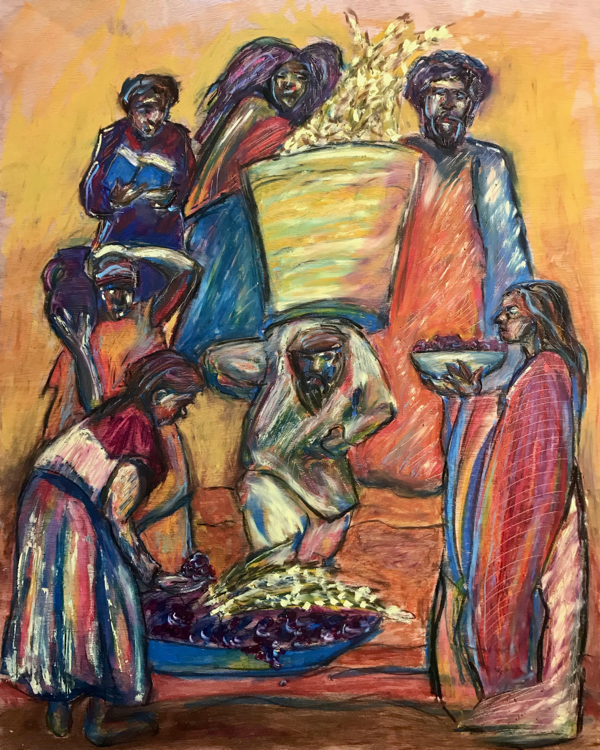saw he was no ordinary child, and they were not afraid of the king’s edict. By faith Moses, when he had grown up, refused to be known as the son of Pharaoh’s daughter. He chose to be mistreated along with the people of God rather than to enjoy the fleeting pleasures of sin. He regarded disgrace for the sake of Christ as of greater value than the treasures of Egypt, because he was looking ahead to his reward. By faith he left Egypt, not fearing the king’s anger; he persevered because he saw him who is invisible. By faith he kept the Passover and the application of blood, so that the destroyer of the firstborn would not touch the firstborn of Israel."
By faith the people passed through the Red Sea as on dry land; but when the Egyptians tried to do so, they were drowned."
Hebrews 11:1-2 “Now faith is the substance of things hoped for and the evidence of things not seen”
We for some weeks now have been working through a list of Old Testament figures taken from the letter to the Hebrews. This chapter begins with the famous words,“now Faith is the substance of things hoped for, the evidence of things not seen”. The list of Old Testament figures we’ve been working through then are chosen as examples of that perspective on faith. They are examples of where people took bold action in the present inspired by looking ahead to the fulfilment of God’s promises in the future, promises whose fulfilment they are would not themselves necessarily live to see. Stepping out in faith, as we often call it.
Last week’s reading included a good example that Paul Simmonds spoke of. Joseph had a remarkable life and he kept his faith and trust in God through his troubles, great troubles. But the act that Hebrews highlights is Joseph at the end of his life, looking ahead to after his death, giving instructions that when his people left Egypt they should take his body with them. He trusted in God’s promise that he would give the Holy Land to his people, though he would not live to see it. So we need to bear that in mind, when we think about what God is saying about Moses in Hebrews. Hebrews does not start with Moses but with his parents. He was the child of faithful parents. They had faith so they put Moses in a basket in the river, not knowing what would happen but knowing, in faith, that there would be a chance for their child.
Our faith never stands on its own but relies on those who came before us and those who will come after. Let us share it and build it, we never know what it might mean. Every great man or woman of history whose name we know, was taught or inspired by someone nobody remembers, who gets no credit, but was essential to that great person achieving what they did. You don’t know what you might achieve with God; and you don’t know who you might affect, and then what they might achieve.
So who was Moses? What did he become? He was in some ways not a very impressive man, like many God chose he was terrified by the idea at first, he begged God to send someone else; he was not an eloquent man, he was so scared of speaking that God had to promise to send Aaron with him. He was someone whose temper sometimes got the best of him. But at the same time he was a man of remarkable courage and a great sense of justice. You can see his courage and sense of justice when he intervened to save a Hebrew being beaten by an Egyptian, but also his temper because he killed the Egyptian. After that he fled Egypt and came to Midian, where he saw a group of women, shepherdesses, being bullied away from a water well by a group of men, and again he wanted to help these women, strangers to him.
Hebrews says Moses could have stayed a Prince in Egypt, he could have wallowed in wealth and earthly pleasures (which does indeed sound nice); but he chose hardship and poverty to be faithful to God and to free his people. So often in the Bible it is not that a man was extraordinarily clever or strong or anything, but that in the end he was willing to take huge risks to stand up and do the right thing, because he had faith in God and his promise. Moses was a man who could stand against the absolute ruler of Egypt, a living god to his people, and command him, saying, God, the true God, has told you, let my people go.
And he did, he freed his people, he freed his people and led them out of Egypt into the desert, trusting that God would lead them to the Promised Land, without knowing how they would possibly get food and water for so many thousands of people, but trusting in God to provide. Later on, he would receive the Law at Mount Sinai, that would guide the Jews in how they must live and worship God; that would prepare the way for Christ by teaching his people that God is Holy, and that though again and again they would fall short, God gave them ways for their sins to be forgiven through sacrifice and prayer. These temporary sacrifices prepared them to understand the one infinite sacrifice that Christ would make to provide an eternal path to free us from our sins.
The Law gives us the image of the Lamb of God, the sacrificial lamb that would become such a power symbol of who God is in Christ; and the 10 commandments that lie right at the heart and basis of our systems of Law and Justice. In fact, Moses was credited with writing more pages of the Bible than any other writer, the first five books, known to the Jews as the Torah, the Teaching. It is the historical core of the Old Testament, and so the whole Bible.
Moses has a crucial role in the achievement of the Exodus, the giving of the Law, and the institution of the Passover. And all three are crucial to understanding Biblical faith. Moses’ achievements are still at the heart of Jewish religion and identity today. The annual celebration of the Passover, remembering how through Moses God rescued his people from Egypt, is the most important ritual in the Jewish year. A liturgy carried out around the family table, as Jews have done for three thousand years, with the foods of the Passover story: the lamb and the flat unleavened bread. Flat bread because there was no time for the dough to rise before the Hebrews had to leave their homes and flee from Egypt.
The Passover is our story as well. The night before he died, Jesus held the last supper with his disciples. This was a Passover meal, where they remembered the Exodus and broke the bread, and ate the lamb and drank the wine. Incredibly, there Jesus took the Passover bread and wine and said, this is my body, this is my blood. He was saying I am God’s salvation, as through Moses God saved his people from slavery in Egypt, so through Jesus, God would save all the world from slavery to sin and death, if we will let him, if we choose to be his people. That is what we remember every time we take Communion, this is what we share: The bread and wine of Passover, the body and blood of Jesus, our Passover lamb.
One thing to note in our reading is how it says Moses “regarded disgrace for the sake of Christ as of greater value than the treasurers of Egypt”. “Disgrace for the sake of Christ”? That might sound strange to us. How did Moses know Christ? We often forget that Hebrews and all the books of the New Testament take for granted that Christ is God and that he was an active presence in the Old Testament, and that the Old Testament Prophets spoke of Christ and believed in him.
At Christmas time, we read the opening to John’s Gospel ‘In the beginning was the Word, and the Word was with God and the Word was God, which is of course places Christ Jesus, the Son of God, right there at the start of Genesis on the first page of the Bible. And he’s there in the Exodus according to this reading from Hebrews. Across the New Testament, particularly in Matthew, in Acts, in Paul’s letters and here in Hebrews, they are saying that the Old Testament speaks of Christ, and Christ was there and known in the Old Testament, in Psalms and Isaiah and everywhere throughout the history of God’s people. This is why you can’t take the Old Testament out of the Bible, because if you did you wouldn’t have a New Testament left. And I don’t just mean that one historically led to the other, I mean that if you removed all the parts of the New Testament that are talking about the Old Testament you would be left with a lot of empty pages.
The Exodus itself, has always been of special importance to people suffering oppression and slavery. That God heard the cry of the slaves, named them his people and brought them out of slavery to the Promised Land. In particular, it was profoundly important to the black slaves of America. Taken from Africa and introduced to the Bible by their captors, still they found in the story of Moses a promise of freedom that defied the men who held them prisoner, and brought meaning and hope that God was with them. Denied education or freedom to meet and organise, they expressed themselves through music, songs sung in fields and simple homes, shared orally and passed down through generations. After slavery was abolished in America in the 1860s these songs were written down and shared widely. In our hymnbooks they used to be called negro spirituals. And Spiritual they certainly are. And it’s an incredible thing that the story of what Moses did could mean so much, thousands of years later and thousands of miles away, to a people in the face of such suffering.
Moses is described as special: in both Exodus and Numbers it is said uniquely that God spoke to Moses not in dreams or riddles but face-to-face, face to face. This is the amazing thing about Jesus, everyone who saw him saw God face-to-face. All the Apostles, all the people who followed Jesus, had a relationship with God as special as this one unique person in the whole Old Testament, and through the Holy Spirit within us, we can say the same. We have a faith passed down from the Patriarchs to Moses, preserved by his parents, lived through his courage; that brought his people into the Promised Land, that was and is always looking to Christ, and to this day is inspiring those suffering oppression to strive for a more just and Christ-like world: the substance of things hoped for, the evidence of things not seen. I pray we will all embrace that faith. It has done mighty things in the past, and with God, it can do mighty things in the future still. Amen.












